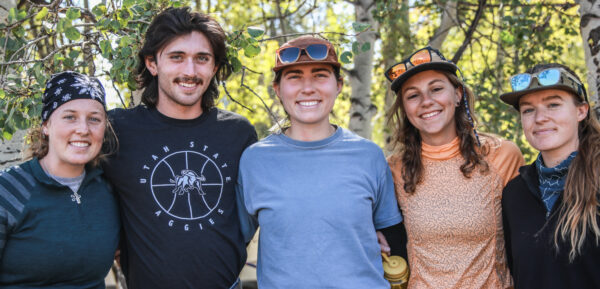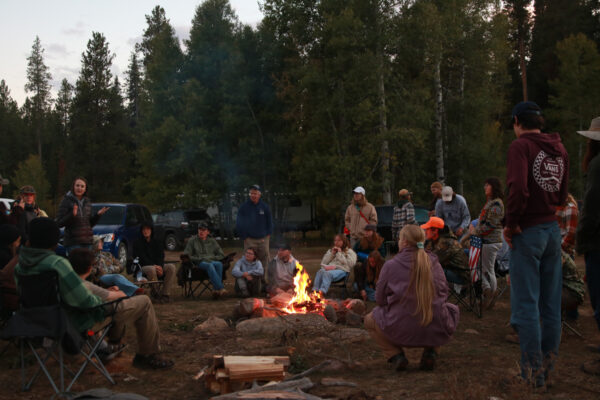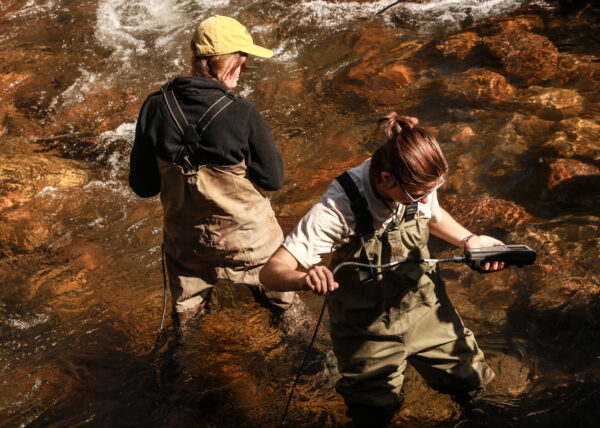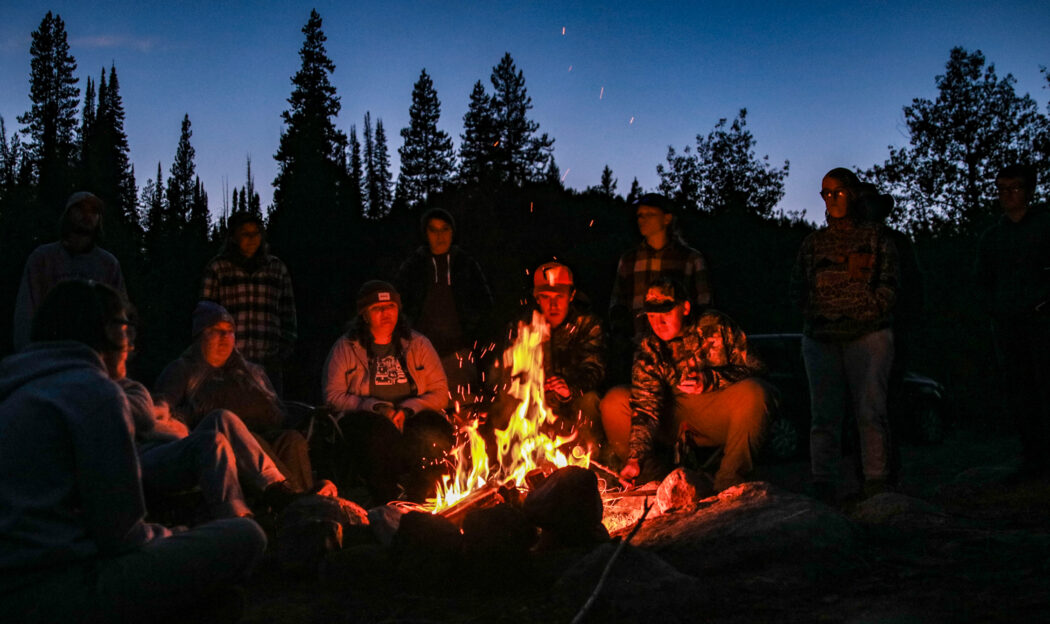QCNR Camp gives students taste for the field
Elexis Bernstein, forestry club president, organized a club event to update the forestry club scrapbook in the spring semester of 2022. Bernstein and another student, Ellie Tenbrink, discovered Forestry Camp while looking through historical photos to put into the scrapbook.
According to Bernstein, Forestry Camp started as an eight-week course provided at many forestry schools for foresters to learn relevant skills and techniques needed for work in forestry that ended in the early 2000s due to a Hantavirus outbreak.
“I was just kind of jealous of the opportunities that we used to have and that a lot of students around the nation had that I didn’t,” Bernstein said. “And so I was like, ‘I have to make this happen for me and my peers.’”
She also talked to students that missed out on valuable field work experiences due to the pandemic, which led to many feeling lost about where to go post-graduation.
“That really motivated me to provide that for everyone,” Bernstein said.
There are more degrees available now than before according to Bernstein, and she felt the desire to give people the opportunity to learn about a wide variety of natural resources-related topics.
“I wanted to expand from doing it just with forestry club to more of an open-minded, let’s gather as many skills as we can,” Bernstein said. “And that’s why I opened it to all of the departments.”
From this discovery and assessment of need by Bernstein, QCNR Camp was born.
The Quinney College of Natural Resources held its third annual QCNR Camp Saturday and Sunday, Sept. 21 and 22.
Stephen Bunnell, chairman for the QCNR Camp committee this year, mentioned a common barrier to access within the natural resources field is people often feel as though they don’t have enough experience to start.
“I’m a firm believer that natural resource education, an opportunity to be in the field and work in the field, should belong to anyone,” Bunnell said.
According to Bunnell, field work is a vital component to work in the world of natural resources.
“It’s vital – without being in the field, you can’t hope to understand ecology,” Bunnell said.
With this in mind, he had similar goals as years past for the camp this year.
Bunnell said, “The goal of the camp is to provide the opportunities to help people get that job and to build confidence so when they do get into the field, or if they’re thinking about joining the college, they get a chance to build that confidence and feel like they have the experience to belong.”
Bunnell began prep work for the camp in March, when he assembled a committee. From there they decided what they hoped to accomplish this year.
“Last year, we focused more on hard techniques. This year, we’re focusing a little bit more on good things to have background in going into the field,” Bunnell said.
Bunnell organized the camp previously in 2023, without the help of a committee and compared the experiences.
“We were all there to work, to learn, and so having a committee with me helped me have a better camp experience,” Bunnell said.

Five members of the QCNR camp committee pose for a photo at the camp site in Franklin Basin on Sept. 22.
To limit barriers for people to attend the camp, the committee provided camping gear at no additional cost to campers from the Outdoor Programs rental shop located on USU campus.
Bunnell said the committee helped coordinate a lot of those things such as rentals, meal plans and van reservations.
“I didn’t have to worry about some of those little things that needed to get done, but I just didn’t have the time or capacity to do,” Bunnell said.
According to Bunnell, the camp included two days of activities that featured professors, students and USU alum who taught various skills and talked about various topics.
The schedule provided by Bunnell showed the camp opened with a land acknowledgement walk by Jack Greene, USU sustainability staff.
Also scheduled were activities such as a GPS and orienteering, hand tools and hitch preparedness workshops.
Tenbrink, a senior in forest ecology and management and restoration of aquatic ecosystems, taught the hitch preparedness workshop.
“When you’re preparing, designate some time to sit down and think through, not necessarily every possible scenario, but lots of scenarios,” Tenbrink said.
She hoped to pass, at times hard-earned, knowledge down to the campers she’s acquired through three years of field work.
“I’ve had some experience and some time to experience trial by fire, so that I could pass on some of the knowledge, so that hopefully, as these people get their first field jobs, they don’t have to do as much trial by fire, and they already have a few things under their belt,” Tenbrink said.
While she said preparation is a very important component of field work, she also said attitude is important.
“Another important piece of it is going into field jobs with a positive attitude and an attitude that you’re just going to roll with the punches,” Tenbrink said. “A lot happens when you’re working in the field.”
She’s taught a section at each year’s camp thus far and also helped Bernstein with the organization of the first camp.
“I taught people how to take tree cores for dendrochronology and estimating tree age,” Tenbrink said. “And then the second year, I helped Steve with some of the meals, and I taught a course on chainsaw maintenance.”
Bernstein and Tenbrink agreed that a field skill-based weekend could be beneficial for people in pursuit of natural resources field jobs and organized the first one in 2022.
Abby Lane, natural resource senator and senior in wildlife ecology and management, said QCNR Camp helped her seek out opportunities to get more involved.
“Experiencing firsthand, coming from a place of uncertainty, having those experiences at QCNR Camp with the people there and learning the skills that I did gave me the confidence to then seek out opportunities to get involved and hopefully give those same experiences,” Lane said.
She agreed that preparation of field skills is an important effort.
“It’s a huge part of just the way the industry is structured,” Lane said. “Students, being able to gain field skills, to get field jobs, is exactly what they need in order to get their foot in the door and get them where they want to end up in their career.”
Lane attended camp as a junior and a camper last year and attended this year to help out as the senator for the college.
“I really enjoyed just being around all the campers and watching the different stations and just observing how people were talking and interacting with each other,” Lane said. “They were asking questions and being really involved in the rotations. It just made me really happy to see that people were putting in effort to get something out of the camp.”
According to the schedule, the first day closed with a fireside by Larissa Yocom, USU fire ecology professor.

Assistant professor, Larissa Yocom, speaks with students about wildland fire during QCNR camp on Sept. 21.
Bunnell said the fireside was a pretty popular section based on results of the post-camp survey though he also said there was interest in activities across the board.
The schedule had five rotating activities on the second day, which included a water quality assessment, soil science workshop, a stream measurement workshop, a crash course in western plants and wildland first aid fundamentals.
Eliza Hegewald, first-year student in environmental studies and rangeland ecology said she liked the variety of workshops and skills taught.
“I think especially since they were like, you can put this on your resume, even though you only did it for an hour – you were in the river for an hour and that counts,” Hegewald said. “It gave you a taste of what being in a river would be like, and doing work there, or doing work firefighting would be like, or being a plant biologist would look like – just a taste of every little side of the different field works.”

Two QCNR campers use probes that measure the chemical properties in water to assess river water quality at QCNR camp on Sept. 22.
As a senior in wildlife and rangeland ecology and management, Bunnell hopes the event continues. The committee consists of almost entirely seniors with Kennedy Price, junior in wildlife ecology and management, as the only one who will remain a student after this year.
She expressed the hope that she will be able to help make the camp happen next year.
“There are a lot of moving parts, and there’s room for everyone so I hope that I will be able to find a spot that will be helpful,” Price said.
Paige Sargeant, senior in management and restoration of aquatic ecosystems, also participated on the committee and said she felt a responsibility to give back.
“One of the reasons I’ve found success in college is because I’ve had other students mentor me through some cool things,” Sargeant said. “It’s been a rewarding experience and a good way to work together with my friends to create something that’s worthwhile for other students.”
Bunnell believes that no one knows what students need better than the students themselves.
“You’re relying on people that have that shared experience with you, that you know aren’t in the same classes as you are in the same situations, majors, colleges, whatever it may be with you, and it’s it was started by students, for students, and I really want to see that legacy continue,” Bunnell said.
He thinks the camp has grown tremendously and that there is only more potential.
“The group of campers this year was incredible. They were so engaged, they were so excited and interested in all of the different concepts and things that we learned,” Bunnell said. “It was really fun. I’m really happy with how it went. And I couldn’t have had it go better.”
Bunnell said he is ready to pass the banner as it was passed to him previously by Bernstein.
“It’s been super fulfilling in my life, and I think it’s been really an awesome journey watching people that participated the first few years, wanting to get involved and wanting to help with future years,” Bunnell said. “It’s a chance to learn and then to give back.”
Both Bunnell and Bernstein said the camp is not just about preparing people for field work in natural resources.
“It’s hard to know what you don’t know, and so I’ve learned that making those experiences accessible really helps people in the long run,” Bunnell said. “It’s cool to still see people that met at camp last year, walking around campus together.”
Bernstein, a USU graduate, works as a forest service worker in the Sawtooth National Forest in Idaho. She said she still uses skills she acquired when she organized QCNR Camp.
“I really wanted to get everyone to know each other and recognize that we all love being outside and that we all love conserving natural resources,” Bernstein said. “And while we might have different opinions of how to do that, we can all work together to do it.”

